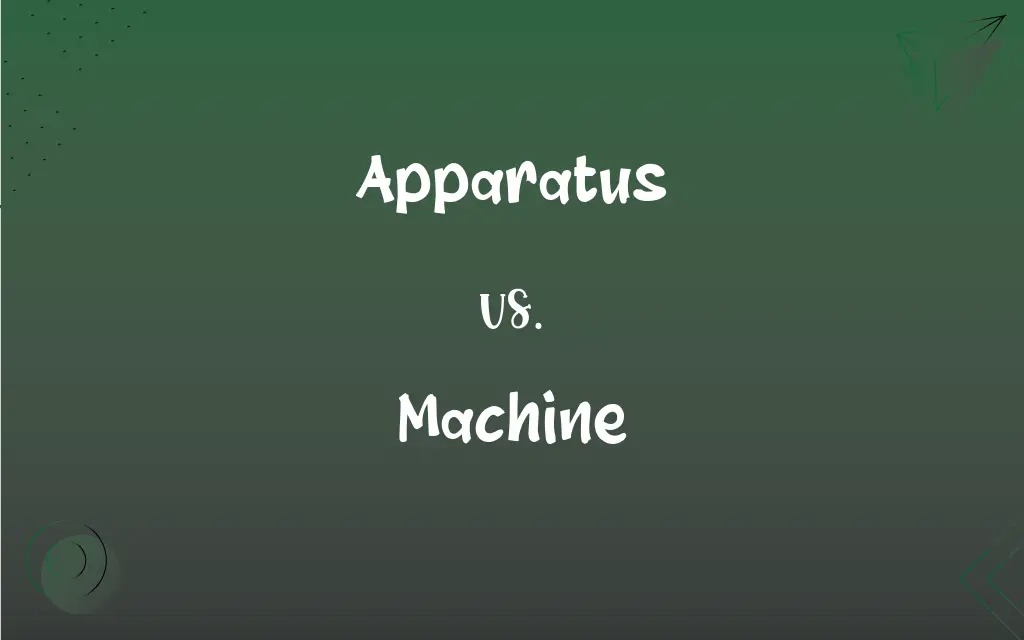Apparatus vs. Machine: What's the Difference?
Edited by Aimie Carlson || By Harlon Moss || Updated on November 29, 2023
Apparatus refers to a set of equipment or tools for a specific purpose, whereas a machine is a device that performs mechanical tasks.

Key Differences
An apparatus is typically a collection of instruments or tools designed for a specific function or experiment. In contrast, a machine is a device, often powered by electricity or mechanical energy, designed to perform a specific task by applying forces and controlling movement.
The term 'apparatus' often implies a setup for scientific experiments or medical procedures, emphasizing its role in facilitating processes. A machine, however, usually signifies a more complex entity capable of independent operation, often used in industrial or mechanical contexts.
Apparatuses are generally more specialized in their usage, serving distinct purposes in laboratories or technical settings. Machines are broader in their application, encompassing everything from simple mechanical contrivances to advanced automated systems.
In usage, apparatuses are often manually operated or manipulated to achieve desired outcomes. Machines, by contrast, often automate processes, reducing the need for continuous human intervention.
An apparatus can be part of a machine, functioning as a component within a larger mechanical system. Conversely, a machine represents a complete system in itself, capable of performing designated functions autonomously.
ADVERTISEMENT
Comparison Chart
Primary Function
Designed for specific tasks, often in scientific or technical contexts.
Built for performing mechanical tasks, often with automation.
Complexity
Can range from simple to complex, often part of a larger system.
Generally more complex, integrating multiple components.
Operation
Often requires manual operation or adjustment.
Usually operates automatically or with minimal human input.
Context of Use
Common in laboratories, medical settings, or specialized industries.
Found in a wide range of settings, including industrial, commercial, and domestic.
Energy Source
May not require an external power source.
Typically powered by electricity, mechanical energy, or hydraulics.
ADVERTISEMENT
Apparatus and Machine Definitions
Apparatus
An intricate structure within a system.
The respiratory apparatus in humans is vital for breathing.
Machine
A vehicle or piece of equipment with moving parts.
The farmer relies on a threshing machine during the harvest.
Apparatus
Tools or equipment used for particular artistic activities.
The photographer’s apparatus includes various lenses and lights.
Machine
A device that performs a specific task through mechanical power.
The factory uses a machine to package products efficiently.
Apparatus
A group of organs with a specific function in a living being.
The digestive apparatus processes the food we eat.
Machine
A system or structure functioning as a whole.
The human body is a complex machine with many interdependent parts.
Apparatus
A set of equipment for a specific purpose.
The laboratory apparatus includes beakers and test tubes for chemical experiments.
Machine
A device used to replace or enhance human effort.
The invention of the sewing machine revolutionized garment production.
Apparatus
A political or organizational system.
The state apparatus was mobilized to implement the new policy.
Machine
A computer or electronic device executing specific tasks.
This coffee machine is programmed to brew at the same time every morning.
Apparatus
An appliance or device for a particular purpose
An x-ray apparatus.
Machine
A device consisting of fixed and moving parts that redirects mechanical energy to accomplish a particular task or set of tasks.
Apparatus
An integrated group of materials or devices used for a particular purpose
Dental apparatus.
Machine
See simple machine.
FAQs
What is an apparatus?
An apparatus is a set of tools or equipment designed for a specific task or experiment.
Are machines always automated?
Many machines are automated, but some require manual operation or supervision.
Is an apparatus limited to scientific use?
No, apparatuses are used in various fields, including science, medicine, and the arts.
Can machines be part of a larger apparatus?
Yes, machines can be components of a larger apparatus in complex systems.
What defines a machine?
A machine is a device that performs mechanical tasks, often powered by electricity or mechanical energy.
Can an apparatus be part of a machine?
Yes, an apparatus can function as a component within a larger mechanical system.
What is an example of a simple machine?
A lever is an example of a simple machine.
Are computers considered machines?
Yes, computers are electronic machines designed to process data.
Do all apparatuses require electricity?
No, some apparatuses operate without an external power source.
How do machines impact productivity?
Machines often increase productivity by automating tasks and processes.
Can a machine exist without moving parts?
Typically, machines have moving parts, but some, like electronic machines, may not.
Do machines always replace human labor?
Not always; some machines enhance human effort rather than replace it.
Can an apparatus be portable?
Yes, many apparatuses, like surveying equipment, are designed to be portable.
Are apparatuses used in education?
Yes, educational apparatuses are used for demonstrations and practical learning.
What is an example of a medical apparatus?
An MRI scanner is an example of a medical apparatus.
Are apparatuses always mechanical?
No, apparatuses can be non-mechanical, like a set of mathematical tools.
What is the role of machines in modern industry?
Machines are central to modern industry, enhancing efficiency and precision.
What distinguishes a complex apparatus from a simple one?
Complexity in an apparatus depends on its function, the number of components, and its integration into larger systems.
Is a musical instrument an apparatus?
Yes, it can be considered an apparatus designed for artistic creation.
Can a machine be manually operated?
Yes, some machines are designed for manual operation.
About Author
Written by
Harlon MossHarlon is a seasoned quality moderator and accomplished content writer for Difference Wiki. An alumnus of the prestigious University of California, he earned his degree in Computer Science. Leveraging his academic background, Harlon brings a meticulous and informed perspective to his work, ensuring content accuracy and excellence.
Edited by
Aimie CarlsonAimie Carlson, holding a master's degree in English literature, is a fervent English language enthusiast. She lends her writing talents to Difference Wiki, a prominent website that specializes in comparisons, offering readers insightful analyses that both captivate and inform.































































